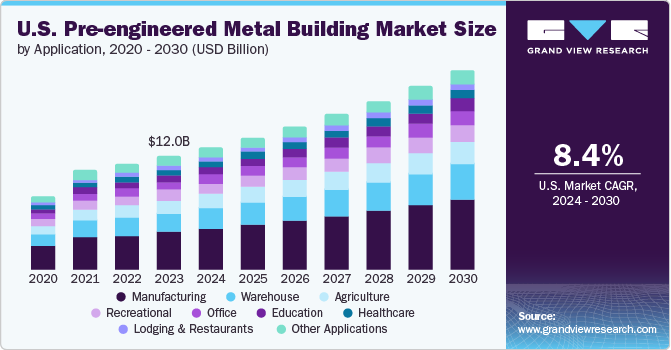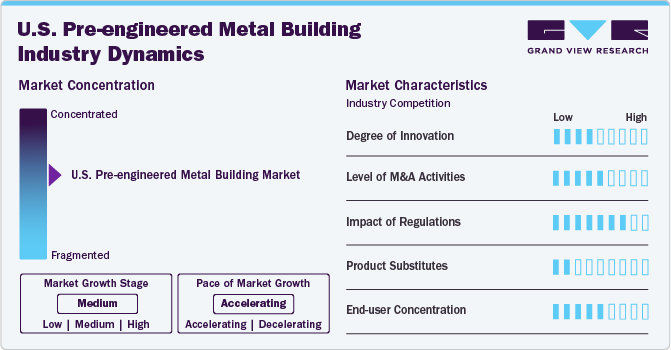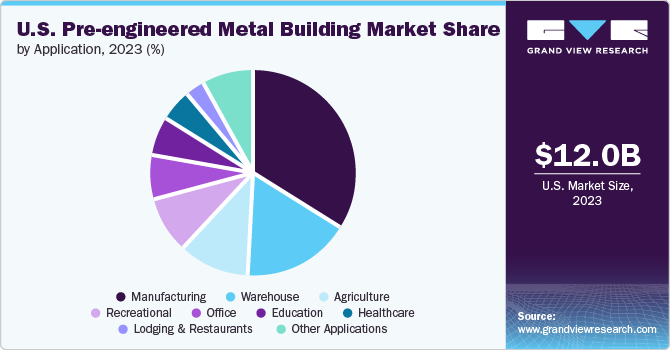
U.S. Pre-engineered Metal Building Market Size, Share & Trends Analysis Report By Application (Office, Warehouse, Healthcare, Education, Recreational, Manufacturing, Lodging & Restaurants), And Segment Forecasts, 2024 - 2030
- Report ID: GVR-4-68040-329-7
- Number of Report Pages: 102
- Format: PDF
- Historical Range: 2018 - 2022
- Forecast Period: 2024 - 2030
- Industry: Advanced Materials
Market Size & Trends
The U.S. pre-engineered metal building market size was estimated at USD 12.04 billion in 2023 and is projected to grow at a CAGR of 8.4% from 2024 to 2030. The growth of the market is attributed to increasing economic development in the western & southern U.S. states and the growing adoption of off-site construction activities.

The use of metal building systems has become a standard process in commercial and industrial construction projects for a long time. These systems are used for developing warehouses, distribution centers, and industrial facilities. The use of metal building systems is anticipated to continue to grow in applications such as commercial office buildings, retail stores, and government infrastructures over the forecast period. Ongoing industrialization across the world has given rise to the demand for industrial storage spaces and warehouses on account of the increasing number of e-commerce and distribution stores in the retail market.
Additionally, flourishing Fast-Moving Consumer Goods (FMCG), e-commerce, pharmaceuticals, and cold storage sectors in the U.S. are all driving the demand for increased warehousing space in the country. Freight and logistics continue to remain an important sector in the country, accounting for a big share of warehousing space. Therefore, such factors are further fueling the market growth.
The urgency for sustainability in the construction industry presents a significant growth opportunity for the pre-engineered metal building market in the country. As environmental consciousness grows, there is a heightened demand for eco-friendly building solutions that minimize carbon footprint and resource depletion.
PEMBs inherently offer several sustainable advantages. First, they are highly recyclable, with a significant portion of the steel used in construction being recycled material. Second, they offer excellent energy efficiency, with options for insulation and reflective coatings that reduce heating and cooling costs. Furthermore, the streamlined construction process of PEMBs generates less waste compared to traditional construction methods, aligning well with sustainable building practices.
Despite the growing demand for pre-engineered metal buildings in the U.S., certain restraints limit the market growth. Although the entire process of pre-engineered metal building seems quick and effortless, manufacturers face numerous hurdles to make this process look easy. For instance, transportation is a restraint for the U.S. pre-engineered metal building market. The components or modules are prefabricated at an off-site factory and transported to an on-site location. Any mishap, damage, or deformation to the module during transportation can impact the entire structure and lead to significant repair or replacement costs.
Market Concentration & Characteristics
Market growth stage is medium, and pace of the market growth is accelerating. The industry is fragmented and characterized by the presence of medium-to large-scale players. Key industry participants are actively involved in innovation, R&D activities, gaining new expertise in steel structures, upgrading the products according to revised regulations, and overall project management. The companies are also involved in customizing the offered products to acquire a more significant market share.
Digital technologies, such as automation and data analytics, can help optimize the production processes and reduce the manufacturing costs of pre-engineered metal components. These reduced costs lead to surged adoption of pre-engineered metal buildings in the U.S., thereby leading to the growth of the market. Additionally, increase in investments in R&D activities related to new technologies can help improve the efficiency of the production and recycling processes of pre-engineered parts.

Various international and U.S.-based associations and regulatory bodies have set regulations with regard to the designing, manufacturing, transportation, and erection of pre-engineered buildings. Furthermore, as pre-engineered metal buildings themselves are substitutes for traditional structures, the threat of other substitutes is low in the market. The players in the construction industry are continuously engaged in research and development activities for fabricating low-cost, high-strength pre-engineered metal buildings for industrial purposes.
The buyers constitute the end users in the value chain of the U.S. pre-engineered metal building market. The growing demand for pre-engineered metal buildings in the country can be attributed to their high strength, increased durability, and reduced erection time. Moreover, the increasing competition among different industries to secure their raw material supply also leads to the surged demand for pre-engineered metal buildings. There are several manufacturers in the market that provide similar products. As such, end users have the option to switch to them.
Application Insights
Based on application, the manufacturing segment accounted for the largest revenue share of 33.8% in 2023 and is anticipated to grow at the fastest rate over the forecast period. Manufacturing facilities often require specific layouts and features to accommodate heavy machinery, storage needs, and production lines. Pre-engineered metal buildings can be customized to meet these unique requirements of the manufacturing sector, including high ceilings, wide spans without interior columns, heavy load-bearing capacities, and low construction & expansion time.

The agriculture segment is expected to grow at a CAGR of 8.4% over the forecast period. Pre-engineered metal buildings are increasingly popular in agricultural construction, offering many benefits over traditional structures like wooden houses or low-rise buildings. Their flexible design allows for the adjustment of internal conditions such as temperature, humidity, and light, which can be tailored to suit various crops and livestock, thereby enhancing their growth and development.
Furthermore, these buildings are also utilized to create cold storage facilities to keep food and agricultural products at low temperatures, thereby prolonging their shelf life. In addition, farmers frequently employ these structures as metal garages or storage sheds for their vehicles and a place to store small equipment, tools, and supplies, maximizing utility and efficiency in agricultural operations.
Key U.S. Pre-engineered Metal Building Company Insights
Some of the key players operating in the market include Nucor Building Systems, Cornerstone Building Brands, Inc., and BlueScope Buildings North America
-
BlueScope Buildings North America, Inc. is a manufacturer of engineered buildings. It is a business unit of BlueScope Steel Ltd., an Australian steel manufacturer. The company operates five businesses in North America under two reporting segments: North Star and Buildings and Coated Products North America (BCPNA). It has seven manufacturing facilities and caters to customers in North America requiring low-rise, non-residential buildings.
-
Nucor Building Systems, a division of Nucor Buildings Group, is engaged in the designing and manufacturing of pre-engineered metal buildings. Nucor uses advanced technologies in its projects, such as Tekla BIM 3D software, an in-house developed NBS Toolbox app, eQuote - a web-based estimation tool, Trimble’s Field Link, and Robotic Total Solutions. The company is accredited with ISO certifications, and is strongly committed to sustainable manufacturing practices, with manufacturing plants located in Indiana, South Carolina, Texas, and Utah.
Western Steel Buildings, Phenix Construction Technologies, and Corle Building Systems, Inc. are some of the emerging market participants in market.
-
Corle Building Systems, Inc. is a manufacturer of pre-engineered building systems for rigid frames, clear-span, and multiple-span buildings. It is a subsidiary of Corle Construction, Inc., a metal building manufacturer based in Imler. It caters to the markets in the U.S. and Canada and is accredited by IAS (U.S.) and CSA-A660 (Canada).
-
Phenix Construction Technologies is a structural steel fabricator and a manufacturer of pre-engineered buildings. The company adheres to standard building codes, such as AISC, MBMA, AISI & ASCE-07, and is ISO 9001 & OHSAS 18001, RDSO, and NABL certified. Its state-of-the-art production facility is located in Texas, with a capacity of 72,000 MT per annum. The company is also located in India and has an AISC-accredited manufacturing facility.
Key U.S. Pre-engineered Metal Building Companies:
- BlueScope Buildings North America
- Western Steel Buildings
- American Buildings
- PEMB-USA
- Kirby Building Systems, LLC
- Phenix Construction Technologies
- Nucor Building Systems
- Inland Building Systems
- Star Building Systems
- Schulte Building Systems, Inc.
- Cornerstone Building Brands, Inc.
- Corle Building Systems, Inc.
- SBI Metal Buildings
- Great Western Buildings
Recent Developments
-
In June 2023, Indiana-based Ambassador Supply acquired a Texas-based pre-engineered building company, Straight Line Metal Buildings, for an undisclosed sum. With this acquisition, Ambassador Supply has 13 design and building-focused companies in its portfolio presently that are located throughout the U.S. This is part of the strategic investment of the former company for expansion in the residential and commercial construction, manufacturing, and building technology industries in the country.
-
In June 2022, Nucor acquired C.H.I., a leading manufacturer of overhead doors for the residential and commercial markets, for a transaction value of USD 3.00 billion. This was part of the value chain integration strategy of Nucor to give it improved control over its raw materials and manufacturing input costs.
U.S. Pre-engineered Metal Building Market Report Scope
|
Report Attribute |
Details |
|
Market size value in 2024 |
USD 12.99 billion |
|
Revenue forecast in 2030 |
USD 21.03 billion |
|
Growth rate |
CAGR of 8.4 % from 2024 to 2030 |
|
Base year for estimation |
2023 |
|
Actual estimates/Historical data |
2018 - 2022 |
|
Forecast period |
2024 - 2030 |
|
Quantitative units |
Revenue in USD million/billion and CAGR from 2024 to 2030 |
|
Report coverage |
Revenue forecast, company ranking, competitive landscape, growth factors, and trends |
|
Segments covered |
Application |
|
Country scope |
U.S. |
|
Key companies profiled |
BlueScope Buildings North America; Western Steel Buildings; American Buildings; PEMB-USA; Kirby Building Systems; LLC; Phenix Construction Technologies; Nucor Building Systems; Inland Building Systems; Star Building Systems; Schulte Building Systems; Inc.; Cornerstone Building Brands; Inc.; Corle Building Systems; Inc.; SBI Metal Buildings; Great Western Buildings |
|
Customization scope |
Free report customization (equivalent up to 8 analysts working days) with purchase. Addition or alteration to country, regional & segment scope. |
|
Pricing and purchase options |
Avail customized purchase options to meet your exact research needs. Explore purchase options |
U.S. Pre-engineered Metal Building Market Report Segmentation
This report forecasts revenue growth at country level and provides an analysis on the latest industry trends in each of the sub-segments from 2018 to 2030. For this study, Grand View Research has segmented the U.S. pre-engineered metal building market report based on application:
-
Application Outlook (Revenue, USD Billion, 2018 - 2030)
-
Office
-
Warehouse
-
Healthcare
-
Education
-
Recreational
-
Manufacturing
-
Agriculture
-
Lodging & Restaurants
-
Other Applications
-
Frequently Asked Questions About This Report
b. The U.S. pre-engineered metal building market size was estimated at USD 12.04 billion in 2023 and is expected to reach USD 12.99 billion in 2024.
b. The U.S. pre-engineered metal building market is expected to grow at a compound annual growth rate of 8.4% from 2024 to 2030 to reach USD 21.03 billion by 2030.
b. Manufacturing segment accounted for the largest U.S. pre-engineered metal building market revenue share of 33.8% in 2023 as these building type can be customized to meet unique requirements of the manufacturing sector.
b. Some of the key players operating in the U.S. pre-engineered metal building market include BlueScope Buildings North America, Western Steel Buildings, American Buildings, PEMB-USA, Kirby Building Systems, LLC, Nucor Building Systems, Inland Building Systems, Cornerstone Building Brands, Inc., Corle Building Systems, Inc., and Great Western Buildings.
b. The key factors that are driving the U.S. pre-engineered metal building market includes growing demand for off-site construction activities in the U.S.
We are committed towards customer satisfaction, and quality service.
"The quality of research they have done for us has been excellent."




